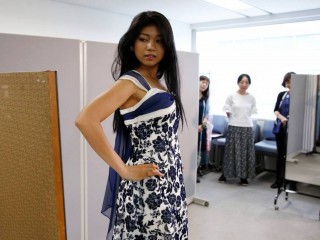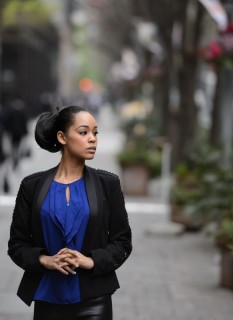Loading
Search
▼ Japan’s Beauty Queens Rewrite Old Rules on Race and Nationality
- Category:Other
It appears that Japan is going through an identity crisis of sorts. Or perhaps an identity shift would be more accurate.
With the crowning of Priyanka Yoshikawa as Miss World Japan 2016, the nation will once again be represented by a multiracial woman on the world stage of beauty — and although somewhat more muted this time around, once again the nation’s social-media feeds were buzzing with 討論 (tōron, debate).
Yoshikawa is a Tokyo native with an Indian 父親 (chichi oya, father) and Japanese 母親 (haha oya, mother), and her 勝利 (shōri, win) at Miss World Japan comes a year after Ariana Miyamoto became the first multiracial woman — she has an African-American father and Japanese mother — to 日本を代表する (Nihon o daihyō suru, represent Japan) in the Miss Universe contest, another of the 世界3大ミスコンテスト (sekai san dai misu kontesuto, world’s three most prestigious Miss beauty pageants).
This led to a particular word turning up particularly frequently on Twitter and Facebook: ハーフ (hāfu, from “half,” meaning “person of mixed race”). In recent years, with a huge rise in 人気 (ninki, popularity) of multiracial タレント (tarento, showbiz talent) such as Rola, Elaiza Ikeda and Chiaki Horan, the term has become a source of 憧れ (akogare, admiration), with the perceived hāfu look being considered exotic.
However, in a historically 単一民族国家 (tan’itsu minzoku kokka, racially homogenous country), where multiracial children make up just 2 percent of those born annually, there is still intense discussion on what it means to be Japanese and, indeed, frequent cases of prejudice against children of mixed race.
Yoshikawa, who is 東京生まれ (Tōkyō umare, Tokyo-born) and speaks fluent Japanese and English, vowed to continue the ongoing fight against 人種的偏見 (jinshuteki henken, racial prejudice) in Japan.
エリアナさんがいなかったら、ハーフの女性が日本の代表になることはなかった (Eriana-san ga inakattara, hāfu no josei ga Nihon daihyō ni naru koto wa nakatta, “Before Ariana, mixed-race girls couldn’t represent Japan”),” she said in a post-contest interview. 私もできないと思っていたから。 宮本エリアナさんは、私や他のハーフの女子たちに勇気を与えてくれた (Watashi mo dekinai to omotteita kara. Miyamoto Eriana-san wa, watashi ya hoka no hāfu no onna-no-ko-tachi ni yūki o ataete kureta,
‘That’s what I thought too. I didn’t doubt it or challenge it until this day. Ariana Miyamoto encouraged me a lot by showing me and showing all mixed girls the way”).
Yoshikawa continued: 私たちは、日本人。純粋な日本人かどうか聞かれるけど、父が インド人であることを誇りに思っている (Watashi-tachi wa, Nihon-jin. Junsuina Nihon-jin ka dō ka kikareru kedo, chichi ga Indo-jin de aru koto o hokori ni omotteiru, “We are Japanese. Yes, I’m half-Indian and people are asking me about my ‘purity.’ My dad is Indian and I’m proud of it”). そして、インド人の血が流れていることも。これらの誇りを持っているからと いって、日本人ではないということにはならない (Soshite, Indo-jin no chi ga nagareteiru koto mo. Korera no hokori o motteiru kara to itte, Nihon-jin de wa nai to iu koto ni wa naranai, “I’m proud that I have Indian in me. But that does not mean I’m not Japanese.’)”
Just like Miyamoto, Yoshikawa faced prejudice in the past because of her 肌の色 (hada no iro, skin color) In Yoshikawa’s case, it was after her 帰国 (kikoku, return to Japan) at the age of 10 following three years living in the U.S. and another year in India.
まるでバイ菌のように思われたけど、その 経験があったから私は本当に強くなった (Maru de baikin no yō ni omowareta kedo, sono keiken ga atta kara watashi wa hontō ni tsuyoku natta, “Everyone thought I was a germ, but those experiences made me really strong”), recalled Yoshikawa.
“We have problems, we’ve been struggling and it hurts.”
We can only hope that issues of “racial purity” will finally become less relevant in an increasingly globalized, and connected, world. The fact that many hāfu women are at the top of the modeling circuit — and even taking top spots at the nation’s most coveted beauty contests — suggests that Japan may be coming to terms with the idea that there’s more to determining 国籍 (kokuseki, nationality) than just bloodlines. Perhaps the term “hāfu” itself will slowly vanish from the Japanese lexicon in coming years.
“When I’m abroad, people never ask me what mix I am,” said Yoshikawa. “As Miss Japan, hopefully I can help change perceptions so that it can be the same here too. The number of people with mixed race is only going to increase, so people have to accept it.”
エリアナさんがいなかったら、ハーフの女性が日本の代表になることはなかった (Eriana-san ga inakattara, hāfu no josei ga Nihon daihyō ni naru koto wa nakatta, “Before Ariana, mixed-race girls couldn’t represent Japan”),” she said in a post-contest interview. 私もできないと思っていたから。 宮本エリアナさんは、私や他のハーフの女子たちに勇気を与えてくれた (Watashi mo dekinai to omotteita kara. Miyamoto Eriana-san wa, watashi ya hoka no hāfu no onna-no-ko-tachi ni yūki o ataete kureta,
‘That’s what I thought too. I didn’t doubt it or challenge it until this day. Ariana Miyamoto encouraged me a lot by showing me and showing all mixed girls the way”).
Yoshikawa continued: 私たちは、日本人。純粋な日本人かどうか聞かれるけど、父が インド人であることを誇りに思っている (Watashi-tachi wa, Nihon-jin. Junsuina Nihon-jin ka dō ka kikareru kedo, chichi ga Indo-jin de aru koto o hokori ni omotteiru, “We are Japanese. Yes, I’m half-Indian and people are asking me about my ‘purity.’ My dad is Indian and I’m proud of it”). そして、インド人の血が流れていることも。これらの誇りを持っているからと いって、日本人ではないということにはならない (Soshite, Indo-jin no chi ga nagareteiru koto mo. Korera no hokori o motteiru kara to itte, Nihon-jin de wa nai to iu koto ni wa naranai, “I’m proud that I have Indian in me. But that does not mean I’m not Japanese.’)”
Just like Miyamoto, Yoshikawa faced prejudice in the past because of her 肌の色 (hada no iro, skin color) In Yoshikawa’s case, it was after her 帰国 (kikoku, return to Japan) at the age of 10 following three years living in the U.S. and another year in India.
まるでバイ菌のように思われたけど、その 経験があったから私は本当に強くなった (Maru de baikin no yō ni omowareta kedo, sono keiken ga atta kara watashi wa hontō ni tsuyoku natta, “Everyone thought I was a germ, but those experiences made me really strong”), recalled Yoshikawa.
“We have problems, we’ve been struggling and it hurts.”
We can only hope that issues of “racial purity” will finally become less relevant in an increasingly globalized, and connected, world. The fact that many hāfu women are at the top of the modeling circuit — and even taking top spots at the nation’s most coveted beauty contests — suggests that Japan may be coming to terms with the idea that there’s more to determining 国籍 (kokuseki, nationality) than just bloodlines. Perhaps the term “hāfu” itself will slowly vanish from the Japanese lexicon in coming years.
“When I’m abroad, people never ask me what mix I am,” said Yoshikawa. “As Miss Japan, hopefully I can help change perceptions so that it can be the same here too. The number of people with mixed race is only going to increase, so people have to accept it.”
- September 23, 2016
- Comment (0)
- Trackback(0)



